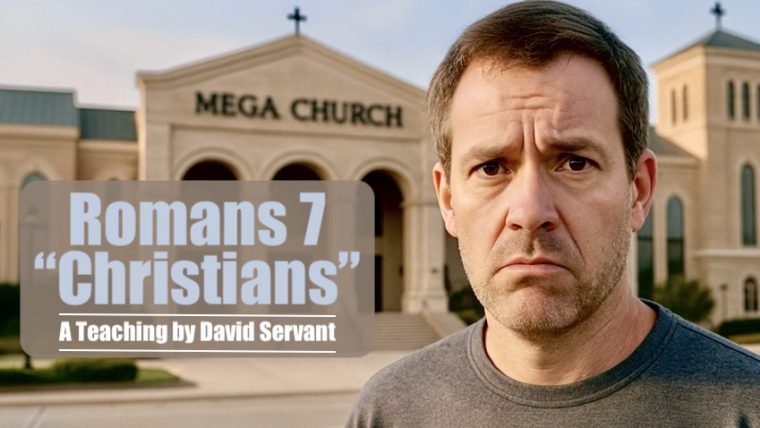
I am of flesh, sold into bondage to sin. For what I am doing, I do not understand; for I am not practicing what I would like to do, but I am doing the very thing I hate (Rom. 7:14-15).
Romans 7:14-15 is often used as scriptural proof that genuine Christians act no different than non-Christians. The only difference is that Christians hate their sin, whereas unbelievers love their sin. If Paul, arguably the greatest Christian who ever lived, was “sold into bondage to sin” and “practiced” what he hated, who are we to claim that genuine Christians demonstrate their faith by holy and obedient lifestyles?
The trouble with that interpretation of Romans 7:14-15—as with all Scriptural misinterpretation—is that it ignores context. It begs the question, “Why then did Paul repeatedly affirm—just seconds earlier in his writing —that all believers have “died to sin” (6:2), are no longer “slaves of sin” (6:6, 17, 20), are “freed from sin” (6:7, 18, 22), are “slaves of righteousness” (6:18), and are “enslaved to God” (6:22)?
Can the man of chapter 6, set free from sin, be the same wretched man of chapter 7 who is a prisoner of sin?
Can the man of chapter 6, whose old self was crucified with Christ that his “body of sin might be done away with” (6:6), be the same man of chapter 7 who longs for someone to set him “free from the body of this death” (7:24)?
The answer to those questions are obvious to anyone who is honest.
And what about Paul’s warning in the very next chapter?:
So then, brethren, we are under obligation, not to the flesh, to live according to the flesh—for if you are living according to the flesh, you must die; but if by the Spirit you are putting to death the deeds of the body, you will live. For all who are being led by the Spirit of God, these are sons of God (Rom. 8:12-14).
If Paul was describing himself in Romans 7—as a believer in bondage to sin and practicing what he hated, obviously “living according to the flesh”—then by his own testimony in chapter 8, he was destined, not to “live” but to “die.” Moreover, he could make no claim to being a child of God since he was not “led by the Spirit.”
And then there is also the wider context of Paul’s other letters. Here is a sampling in a few other places of how Paul described his lifestyle:
For I am conscious of nothing against myself, yet I am not by this acquitted; but the one who examines me is the Lord (1 Cor. 4:4).
For our proud confidence is this: the testimony of our conscience, that in holiness and godly sincerity, not in fleshly wisdom but in the grace of God, we have conducted ourselves in the world, and especially toward you (2 Cor. 1:12).
You are witnesses, and so is God, how devoutly and uprightly and blamelessly we behaved toward you believers (1 Thes. 2:10).
I thank God, whom I serve with a clear conscience the way my forefathers did (2 Tim. 1:3).
Paul sure doesn’t sound in those passages like someone who was in bondage to sin and who practiced what he hated.
All of this being so, it is quite obvious that in Romans 7:14-15, Paul was writing about his former experience as a God-fearing Jew under the Mosaic Law. Just because he wrote in the present tense is not enough proof to conclude otherwise. All of us sometimes use the present tense to describe past events.
Some claim that Paul must have been speaking of his current Christian experience because he said that he wanted to do right and “joyfully concurred with the law of God in the inner man” (7:21- 22). Surely, they say, no depraved unbeliever would say such a thing, being a sinner to the core.
We must remember, however, that Paul was a very zealous Jewish Pharisee before his salvation. He, unlike the average unsaved person, was doing everything he could to obey God’s laws, to the point of even persecuting the church. He found, however, that no matter how hard he tried, he remained a slave to sin. Truly, there is no more wretched person than the one who is trying to live by God’s standards who is not born again. Praise God for Jesus, who sets us free from sin’s bondage!
But here’s the greatest tragedy: People who think they are born again but are not born again often identify with the experience Paul described in Romans 7:14-15. They want to do what is right, but they can’t. And they attend a church where the pastor is not really born again (but thinks he is) and he preaches that Paul was writing in Romans 7:14-15 about his current state as a Christian. And that false teaching gives all the church people a false assurance that they are born again. So everyone remains deceived and on the road to hell. They are goats who think they are sheep. And for some reason, those kinds of pastors never acknowledge any of the other passages in the New Testament that might expose the error of their false teaching, such as 1 John 3:7-10:
Little children, make sure no one deceives you; the one who practices righteousness is righteous, just as He is righteous; the one who practices sin is of the devil; for the devil has sinned from the beginning. The Son of God appeared for this purpose, to destroy the works of the devil. No one who is born of God practices sin, because His seed abides in him; and he cannot sin, because he is born of God. By this the children of God and the children of the devil are obvious: anyone who does not practice righteousness is not of God, nor the one who does not love his brother.
I wonder if Paul would have agreed with 1 John 3:1-10? (The answer is obvious.)
And there are scores of other New Testament passages that affirm those same truths. Again, any honest person can see that.
The good news is that anyone can be genuinely born again and be set free from sin’s bondage! The means to a genuine new birth is repentance and faith in the Lord Jesus Christ. If you believe in the Lord Jesus Christ, you turn from your rebellion and Jesus becomes your Lord. If He is not your Lord, you don’t yet actually believe in Him. You may believe in some American version of Him, but you don’t yet believe in Bible Jesus. Until you do, you will not experience the new birth in all its blessing. It is just that simple.
Amazingly, an entire theology has been concocted about the grace of God that stands against the Lordship of the Lord. Its advocates preach against what they dismissively refer to as “Lordship Salvation,” as if there is any salvation other than salvation that is given to those who believe in the Lord Jesus Christ! They talk about the “Lord” and call Him “Lord,” but preach that He doesn’t have to be your Lord if you want to be saved! Some even say that, if you claim that Jesus must be Lord to be saved, you are a legalist or “wolf in sheep’s clothing”!
Run from those heretics and blasphemers! Run for your life!


